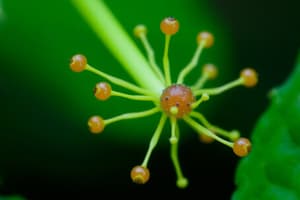Podcast
Questions and Answers
What is the primary function of carbohydrates in cells?
What is the primary function of carbohydrates in cells?
Energy source
What is the process by which new species emerge?
What is the process by which new species emerge?
Speciation
What is the term for the study of evolutionary relationships between organisms?
What is the term for the study of evolutionary relationships between organisms?
Phylogeny
Flashcards are hidden until you start studying
Study Notes
Branches of Biology
- Botany: study of plants
- Zoology: study of animals
- Microbiology: study of microorganisms
- Ecology: study of interactions between organisms and their environment
- Biochemistry: study of chemical processes in living organisms
- Molecular Biology: study of biological molecules and their interactions
- Cellular Biology: study of cell structure, function, and behavior
- Genetics: study of heredity and variation
- Evolutionary Biology: study of evolution and natural selection
- Biophysics: study of physical principles underlying biological processes
Levels of Organization
- Molecule: basic building blocks of life (e.g., DNA, proteins, carbohydrates)
- Cell: basic structural and functional unit of life
- Tissue: group of similar cells performing a specific function
- Organ: structure composed of multiple tissues performing a specific function
- Organ System: group of organs working together to perform a specific function
- Organism: individual living thing
- Population: group of organisms of the same species living in a specific area
- Community: group of different species living in a specific area
- Ecosystem: community of organisms and their physical environment
- Biosphere: global sum of all ecosystems
Biological Molecules
- Carbohydrates: energy source for cells (e.g., sugars, starches, cellulose)
- Proteins: structural, functional, and regulatory molecules (e.g., enzymes, hormones, antibodies)
- Lipids: energy storage and structural molecules (e.g., fats, oils, cholesterol)
- Nucleic Acids: genetic information storage molecules (e.g., DNA, RNA)
Cellular Processes
- Photosynthesis: light-dependent process converting CO2 and H2O into glucose and O2
- Cellular Respiration: process converting glucose into energy (ATP) for the cell
- Mitosis: process of cell division resulting in two daughter cells
- Meiosis: process of gamete formation (sperm, egg)
Evolution
- Natural Selection: process by which populations adapt to their environment
- Speciation: process by which new species emerge
- ** Phylogeny**: study of evolutionary relationships between organisms
Ecosystems
- Producers: organisms that produce their own food (e.g., plants, algae)
- Consumers: organisms that obtain energy by consuming other organisms
- Decomposers: organisms that break down dead organic matter
- Food Chains: linear sequences of energy transfer between organisms
- Food Webs: complex networks of energy transfer between organisms
Branches of Biology
- Botany studies plants
- Zoology studies animals
- Microbiology studies microorganisms
- Ecology studies interactions between organisms and their environment
- Biochemistry studies chemical processes in living organisms
- Molecular Biology studies biological molecules and their interactions
- Cellular Biology studies cell structure, function, and behavior
- Genetics studies heredity and variation
- Evolutionary Biology studies evolution and natural selection
- Biophysics studies physical principles underlying biological processes
Levels of Organization
- Molecules are the basic building blocks of life, e.g. DNA, proteins, carbohydrates
- Cells are the basic structural and functional units of life
- Tissues are groups of similar cells performing a specific function
- Organs are structures composed of multiple tissues performing a specific function
- Organ Systems are groups of organs working together to perform a specific function
- Organisms are individual living things
- Populations are groups of organisms of the same species living in a specific area
- Communities are groups of different species living in a specific area
- Ecosystems are communities of organisms and their physical environment
- The Biosphere is the global sum of all ecosystems
Biological Molecules
- Carbohydrates are energy sources for cells, e.g. sugars, starches, cellulose
- Proteins are structural, functional, and regulatory molecules, e.g. enzymes, hormones, antibodies
- Lipids are energy storage and structural molecules, e.g. fats, oils, cholesterol
- Nucleic Acids are genetic information storage molecules, e.g. DNA, RNA
Cellular Processes
- Photosynthesis is a light-dependent process converting CO2 and H2O into glucose and O2
- Cellular Respiration is the process converting glucose into energy (ATP) for the cell
- Mitosis is the process of cell division resulting in two daughter cells
- Meiosis is the process of gamete formation (sperm, egg)
Evolution
- Natural Selection is the process by which populations adapt to their environment
- Speciation is the process by which new species emerge
- Phylogeny is the study of evolutionary relationships between organisms
Ecosystems
- Producers are organisms that produce their own food, e.g. plants, algae
- Consumers are organisms that obtain energy by consuming other organisms
- Decomposers are organisms that break down dead organic matter
- Food Chains are linear sequences of energy transfer between organisms
- Food Webs are complex networks of energy transfer between organisms
Studying That Suits You
Use AI to generate personalized quizzes and flashcards to suit your learning preferences.




